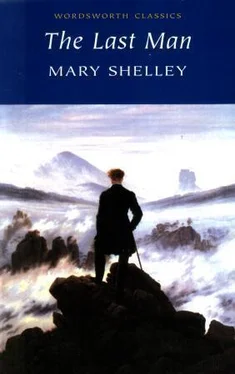The debate had ended at three in the morning. My soul was in tumults; I traversed the streets with eager rapidity. Truly, I was mad that night—love—which I have named a giant from its birth, wrestled with despair! My heart, the field of combat, was wounded by the iron heel of the one, watered by the gushing tears of the other. Day, hateful to me, dawned; I retreated to my lodgings—I threw myself on a couch—I slept—was it sleep?—for thought was still alive—love and despair struggled still, and I writhed with unendurable pain.
I awoke half stupefied; I felt a heavy oppression on me, but knew not wherefore; I entered, as it were, the council-chamber of my brain, and questioned the various ministers of thought therein assembled; too soon I remembered all; too soon my limbs quivered beneath the tormenting power; soon, too soon, I knew myself a slave!
Suddenly, unannounced, Lord Raymond entered my apartment. He came in gaily, singing the Tyrolese song of liberty; noticed me with a gracious nod, and threw himself on a sofa opposite the copy of a bust of the Apollo Belvedere. After one or two trivial remarks, to which I sullenly replied, he suddenly cried, looking at the bust, “I am called like that victor! Not a bad idea; the head will serve for my new coinage, and be an omen to all dutiful subjects of my future success.”
He said this in his most gay, yet benevolent manner, and smiled, not disdainfully, but in playful mockery of himself. Then his countenance suddenly darkened, and in that shrill tone peculiar to himself, he cried, “I fought a good battle last night; higher conquest the plains of Greece never saw me achieve. Now I am the first man in the state, burthen of every ballad, and object of old women’s mumbled devotions. What are your meditations? You, who fancy that you can read the human soul, as your native lake reads each crevice and folding of its surrounding hills—say what you think of me; king-expectant, angel or devil, which?”
This ironical tone was discord to my bursting, over-boiling heart; I was nettled by his insolence, and replied with bitterness; “There is a spirit, neither angel or devil, damned to limbo merely.” I saw his cheeks become pale, and his lips whiten and quiver; his anger served but to enkindle mine, and I answered with a determined look his eyes which glared on me; suddenly they were withdrawn, cast down, a tear, I thought, wetted the dark lashes; I was softened, and with involuntary emotion added, “Not that you are such, my dear lord.”
I paused, even awed by the agitation he evinced; “Yes,” he said at length, rising and biting his lip, as he strove to curb his passion; “Such am I! You do not know me, Verney; neither you, nor our audience of last night, nor does universal England know aught of me. I stand here, it would seem, an elected king; this hand is about to grasp a sceptre; these brows feel in each nerve the coming diadem. I appear to have strength, power, victory; standing as a dome-supporting column stands; and I am—a reed! I have ambition, and that attains its aim; my nightly dreams are realized, my waking hopes fulfilled; a kingdom awaits my acceptance, my enemies are overthrown. But here,” and he struck his heart with violence, “here is the rebel, here the stumbling-block; this over-ruling heart, which I may drain of its living blood; but, while one fluttering pulsation remains, I am its slave.”
He spoke with a broken voice, then bowed his head, and, hiding his face in his hands, wept. I was still smarting from my own disappointment; yet this scene oppressed me even to terror, nor could I interrupt his access of passion. It subsided at length; and, throwing himself on the couch, he remained silent and motionless, except that his changeful features showed a strong internal conflict. At last he rose, and said in his usual tone of voice, “The time grows on us, Verney, I must away. Let me not forget my chiefest errand here. Will you accompany me to Windsor to-morrow? You will not be dishonoured by my society, and as this is probably the last service, or disservice you can do me, will you grant my request?”
He held out his hand with almost a bashful air. Swiftly I thought—Yes, I will witness the last scene of the drama. Beside which, his mien conquered me, and an affectionate sentiment towards him, again filled my heart—I bade him command me. “Aye, that I will,” said he gaily, “that’s my cue now; be with me to-morrow morning by seven; be secret and faithful; and you shall be groom of the stole ere long.”
So saying, he hastened away, vaulted on his horse, and with a gesture as if he gave me his hand to kiss, bade me another laughing adieu. Left to myself, I strove with painful intensity to divine the motive of his request and foresee the events of the coming day. The hours passed on unperceived; my head ached with thought, the nerves seemed teeming with the over full fraught—I clasped my burning brow, as if my fevered hand could medicine its pain.
I was punctual to the appointed hour on the following day, and found Lord Raymond waiting for me. We got into his carriage, and proceeded towards Windsor. I had tutored myself, and was resolved by no outward sign to disclose my internal agitation.
“What a mistake Ryland made,” said Raymond, “when he thought to overpower me the other night. He spoke well, very well; such an harangue would have succeeded better addressed to me singly, than to the fools and knaves assembled yonder. Had I been alone, I should have listened to him with a wish to hear reason, but when he endeavoured to vanquish me in my own territory, with my own weapons, he put me on my mettle, and the event was such as all might have expected.”
I smiled incredulously, and replied: “I am of Ryland’s way of thinking, and will, if you please, repeat all his arguments; we shall see how far you will be induced by them, to change the royal for the patriotic style.”
“The repetition would be useless,” said Raymond, “since I well remember them, and have many others, self-suggested, which speak with unanswerable persuasion.”
He did not explain himself, nor did I make any remark on his reply. Our silence endured for some miles, till the country with open fields, or shady woods and parks, presented pleasant objects to our view. After some observations on the scenery and seats, Raymond said: “Philosophers have called man a microcosm of nature, and find a reflection in the internal mind for all this machinery visibly at work around us. This theory has often been a source of amusement to me; and many an idle hour have I spent, exercising my ingenuity in finding resemblances. Does not Lord Bacon say that, ‘the falling from a discord to a concord, which maketh great sweetness in music, hath an agreement with the affections, which are re-integrated to the better after some dislikes?’ What a sea is the tide of passion, whose fountains are in our own nature! Our virtues are the quick-sands, which show themselves at calm and low water; but let the waves arise and the winds buffet them, and the poor devil whose hope was in their durability, finds them sink from under him. The fashions of the world, its exigencies, educations and pursuits, are winds to drive our wills, like clouds all one way; but let a thunderstorm arise in the shape of love, hate, or ambition, and the rack goes backward, stemming the opposing air in triumph.”
“Yet,” replied I, “nature always presents to our eyes the appearance of a patient: while there is an active principle in man which is capable of ruling fortune, and at least of tacking against the gale, till it in some mode conquers it.”
“There is more of what is specious than true in your distinction,” said my companion. “Did we form ourselves, choosing our dispositions, and our powers? I find myself, for one, as a stringed instrument with chords and stops—but I have no power to turn the pegs, or pitch my thoughts to a higher or lower key.”
Читать дальше












